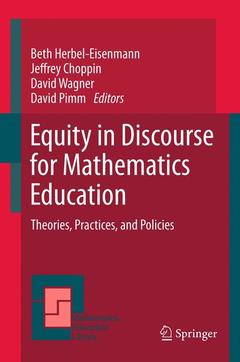Description
Equity in Discourse for Mathematics Education, 2012
Theories, Practices, and Policies
Mathematics Education Library Series, Vol. 55
Coordinators: Herbel-Eisenmann Beth, Choppin Jeffrey, Wagner David, Pimm David
Language: English
Subjects for Equity in Discourse for Mathematics Education:
Keywords
Publication date: 03-2014
270 p. · 15.5x23.5 cm · Paperback
Publication date: 12-2011
270 p. · 15.5x23.5 cm · Paperback
Description
/li>Contents
/li>Biography
/li>Comment
/li>
This book explores the connection between the ways people speak in mathematics classrooms and their opportunities to learn mathematics. The words spoken, heard, written and read in mathematics classrooms shape students? sense of what mathematics is and of what people can do with mathematics. The authors employ multiple perspectives to consider the means for transformative action with respect to increasing opportunities for traditionally marginalized students to form mathematical identities that resonate with their cultural, social, linguistic, and political beings.
Jeffrey Choppin won the Presidential Award for Excellence in Mathematics and Science Teaching in 1995 and has served as Chair of the editorial panel for the Mathematics Teacher journal. <BR><BR>
David Wagner currently serves on the board of directors of For the Learning of Mathematics and as a member of the Nonkilling Science and Technology Research Committee. He has served on the steering committee for the Psychology of Mathematics Education, North American Chapter. <BR><BR>
In June 2010, when he retired, David Pimm was made professor emeritus at the University of Alberta, Canada and was editor of For the Learning of Mathematics for six years.
Investigates the complex connections between equity and discourse
Makes explicit connections between discourse and equity in mathematics education research
Connects the research to policy implications?




